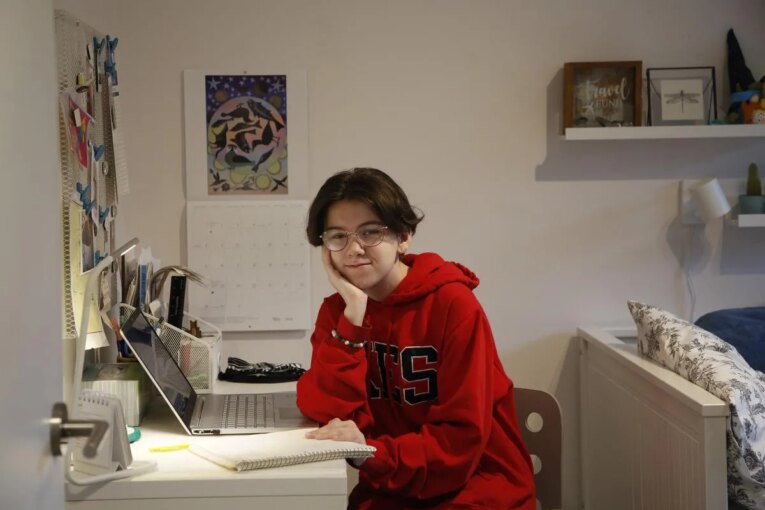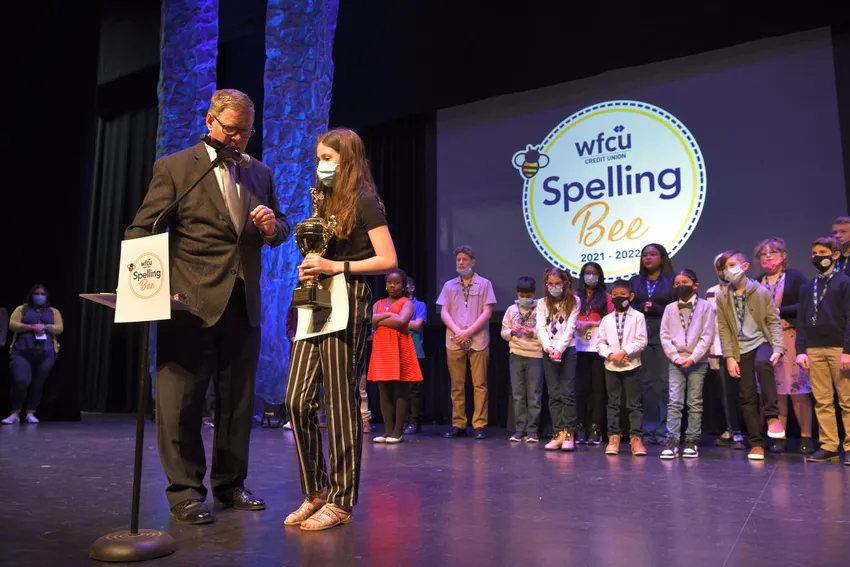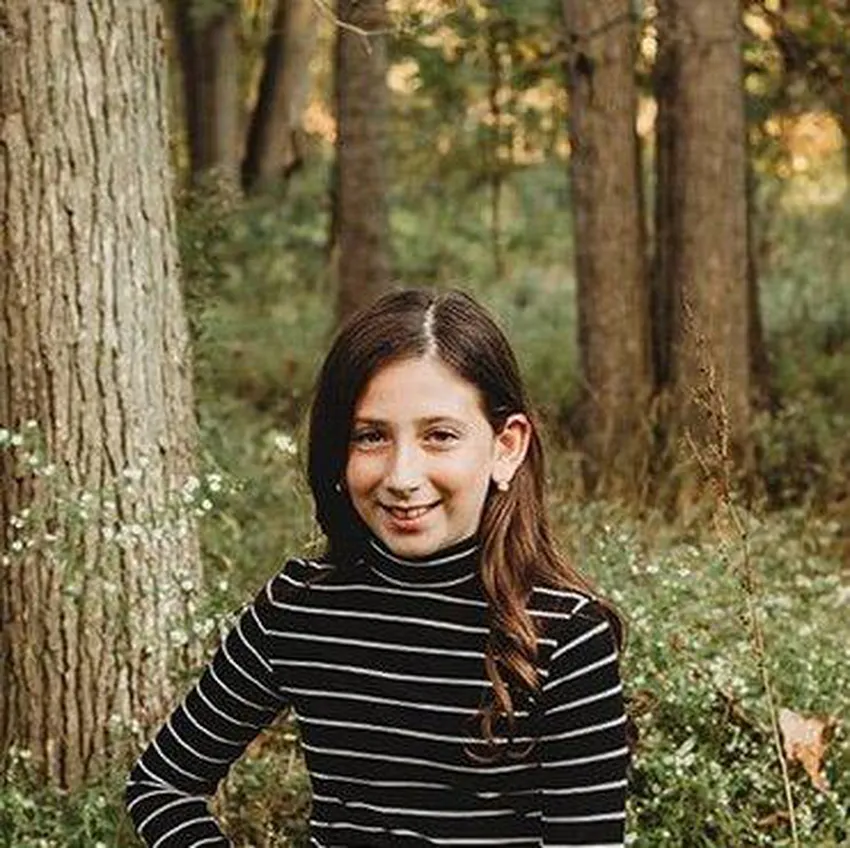
When Jonathan Schut was four, he announced that he could spell “octopus” and proceeded to wow his mom from the back of the minivan. Everyone knew Jon was a good speller, so when the Canspell bee came to P.E.I., his grandfather picked up a study kit.
Schut remembers sitting on the top bunk of his room that first year, staring at words he could barely pronounce. It took some time to settle in to the secret of competitive spelling, to treat the words as puzzles to unlock, not objects to memorize.
“I would say no to going out with friends … and it wasn’t that I had to study. It was that I wanted to,” says Schut, now 28 and the special projects co-ordinator for a trucking company. “It was just that much fun.”
Canspell was created in 2005 by the Canwest newspaper chain. Thousands of students competed and the best went to Ottawa for the national bee, then to Washington for the Scripps National Spelling Bee. Canadians did well there. Three came within a word of winning, dispatched by “Weltschmerz,” “coryza” and “sorites,” respectively.
Schut remembers every word he missed. He is haunted by yurt, which knocked him out in Ottawa in 2008. His reaction, eyes wide with skepticism, made the paper back home.
The glory days did not last. In 2009, Canwest entered bankruptcy protection. Not long after, Postmedia acquired its print holdings. Few knew that 2012 would be the last bee, that vindaloo would be the final winning word. It had been eight years of children holding trophies bigger than their heads, eight years of orthographic combat rendered in quirky detail, eight years of friendships forged over tricky Gaelic words. When it ended, there was no story, no headline. Just a note on the website. Meanwhile, the words grew more obscure at Scripps as the spelling became more intense. The storied bee returns at the end of May.
“It took a lot of effort to build that whole program,” says former Canwest senior executive David Asper in an interview. “And to see it fade is really regrettable.”
Spelling bee preparation is often a solitary pursuit, but Canspell created a network of students who traded emails and helped motivate each other.
“Especially in preparing for Scripps, I feel like we were all part of a team representing a country,” Schut says. “And I think that has been lost.”
The path to Scripps narrowed, the institutional memory faded and the spellers grew up. Some became engineers, doctors, and one a famous “Jeopardy!” champion. Nobody took up the national cause, but a few newspapers and community groups tried to keep going. A fragmented system emerged.
Nova Scotia’s Amelia Glass only learned that two other Canadians were headed to Washington when Scripps published the contestant list this spring. There was no way to get in touch.
“I can’t hope to win,” Glass says, “but I’m going to hope to at least get past the preliminaries.”
The 13-year-old rookie has watched the documentaries, and marvelled at the devotion of the Americans. “They’ve spelled their whole lives.”
Canspell was dreamed up by the Canwest marketing department. It was a natural extension of their Raise-a-Reader program, says Asper. There was no financial payoff. “It was just a good thing to do.”
It was a logistical feat: hundreds of schools held their own bees, and the winners advanced to regional contests sponsored by newspapers across the country. Canspell wrangled everything: judges, corporate sponsors, volunteers, logistics, rules, travel, students, families. Regional winners flew to Ottawa and Washington for all-inclusive academic contests, complete with educational tours, dinners and hobnobbing with ambassadors and politicians.
Coming from sleepy P.E.I., Schut was captivated by the traffic and the history.
“I remember just being wide-eyed at everything that we got to do,” he says.
Canspell was not the only bee in Canada. The Spelling Bee of Canada was founded in 1987 by Julie Spence.
Her bee is a charitable organization and has a modest cash prize, but most parents enrol their children to build confidence. During the Canspell days, some top spellers did both bees, but it has never been a feeder for Scripps.
Scripps regional qualifiers must conform to certain rules and require a sponsorship of $5,000 (U.S.), plus travel expenses. There are currently two in Canada. One is sponsored by the WFCU Credit Union in Windsor, the other by Cape Breton University.
This year marked a comeback for the Nova Scotia bee, which had been on hiatus since 2017. English professor Todd Pettigrew organized it. In the U.S., they integrate the bee into the classroom, but competitive events are discouraged in Nova Scotia, which made school outreach difficult, he says. This year, four schools sent six spellers to the regional bee. (Windsor, which has held the bee for a few years now, had 28 schools involved.)
“I love to see those kids standing on the stage, getting a trophy and everybody cheering because they’re good with words,” Pettigrew says. “You know, that warms my heart more than I could tell you.”
Amelia Glass, who loves fantasy books and wants to be a graphic designer, won the Nova Scotia bee with “squeamish.”
Isabella Cowan, 11, who likes playing soccer and baseball, won the Windsor bee with “edification.” Also new to spelling, she finds it fun, but was surprised by the lack of redemption. “You only get one chance,” she says. “Once you mess up, you’re out.”
Windsor’s runner-up Zain Malik, 13, likes playing video games and watching sports. The credit union decided to send two students this year to make up for the pandemic. “I’m a little nervous,” says Malik, “But I’m really looking forward to the experience and I hope I do well.”
From its early days, competitive spelling has been both a social event and a way to model success, says R.J. McArthur, who wrote about spelling bees during a PhD at the University of Toronto.
Many former spellers credit the bee with helping to shape their love of learning; others cite its way of encouraging self-discipline and confidence. Mattea Roach, the 23-day “Jeopardy!” champion, was a Canspeller. She was eight when she advanced to the Calgary regionals in 2007.
Cody Wang, then 12, won that Calgary bee with “infructuous.” Now 27, he is a software engineer for Amazon in Seattle. Spelling influenced his career in math and science by teaching him deconstruction and analysis. Jonathan Schut learned how to seize the moment, and how to breathe effectively when his heart was racing.
Both studied with the help of a parent or teacher. Schut didn’t recall private coaches, but Wang said there was a burgeoning industry even then.
Scripps has always drawn elite spellers, but Schut met plenty of people like him who treated it as a fun hobby. “The level of commitment that these young people are putting in now is vastly greater than anything I ever did,” he says.
There is a lot of money and glory on the line. Along with the top prize of $50,000 (U.S.), the bee is broadcast on television. For nearly three decades, it was a quirky bit of programming for ESPN. In 2022, it will be broadcast on Scripps-owned over-the-air networks Ion and Bounce. Actor LeVar Burton will host.
The spelling bee preparation industry has grown in the last decade with private coaches, tutors and online programs like SpellPundit that offer study guides and word lists for a fee. There are books, and off-season bees to stay sharp. All of these things cost money, and most of the top spellers in the bee use a combination of them.
“I can’t even describe what not having SpellPundit is like,” 2021 champion Zaila Avant-garde told Time magazine, which noted the $600 cost of an annual subscription. “Like having a book but no pages.”
Avant-garde is the first Black American to be crowned champion. She has been vocal about the financial barriers that some students face, says J. Michael Durnil, Scripps National Spelling Bee’s executive director. It’s a concern at Scripps headquarters. They are working on it, and plan to introduce a few programs in the fall.
“We want to make sure that every student sees themselves on the national stage.”
When Zain Malik learned that many top spellers use professional coaches, he was a little discouraged, says his mother. “That takes it to another level. It’s almost like a beauty pageant,” Saima Ahmad says.
The three Canadians heading to Scripps aren’t using any private tutors or costly programs. They’re trying their best, preparing to go head to head with an American institution. Their expectations are measured.
Nova Scotia’s Amelia Glass is still drawing, still sewing. The bee is not her life.
“I mean, I only learned about it this school year,” she says.
She hopes she can return. Todd Pettigrew isn’t sure what the bee’s future will be.
“If we can keep it going, it will have to mean more of the schools embracing the idea,” he says. He hopes the buzz of a Nova Scotian heading to Washington will encourage other schools to vie for the chance.
Only 22 per cent of Scripps regional bees are now sponsored by newspapers, a reflection of the decline in print media. The rest are funded by community organizations, businesses, universities and sports teams, including the NFL’s Tennessee Titans and Carolina Panthers.
Most of Canada falls in what Scripps calls an “uncovered area” with no path to Washington. But there are signs of a resurgence. During the pandemic, the WFCU credit union expanded, and will bring the regional bee to the Waterloo area next year. It’s more rewarding than slapping their name on a building, says credit union CEO Eddie Francis, the former mayor of Windsor.
“You want to talk about post-pandemic and the requirement to focus on something?” he asks. “Child literacy, I think, is a key thing that can’t be lost.”
FRANKLIN, WEBSTER AND THE HISTORY OF THE BEE
Historians trace the American spelling bee to Benjamin Franklin. The founding father thought a lot about his country, and he thought a lot about literacy. Not all of his ideas stuck. (The turkey, he wrote was a “Bird of courage” and a far better choice for an official bird than the eagle, which had “Bad Moral character.”) He believed it was imperative to the future of the nation that more people learned how to read and write properly. He thought it wise to start them young, and to motivate students with a contest.
“He that spells truly most of the other’s Words, is Victor for that Day; he that is Victor most Days in a Month, to obtain a Prize, a pretty neat Book of some Kind useful in their future Studies,” he spitballed in 1751.
But what language would they use? After shaking loose their British overlords in the Revolutionary War, the King’s English didn’t seem appropriate. Franklin’s contemporary Noah Webster came up with a lucrative loophole.
“Let’s do English, but let’s do our own, and that’s a way to sort of express our disgust for the mother country, but still retain our identity,” says Joshua Kendall, author of“The Forgotten Founding Father: Noah Webster’s Obsession and the Creation of an American Culture.”
Webster popularized American English with his “American Spelling book,” tossing aside the u’s in words like “mould,” and deciding “center” made better sense than “centre,” and that the “k” in mimick was rather superfluous. Most of his changes stuck. Some, like “vulcano,” did not.
The slim blue book, first published in 1783, became the backbone of American English, a cash cow that sold millions of copies and financed the dictionary Webster would later write. It was the go-to reference for the spelling competitions Franklin had suggested.
Around 1800, in New England, you’d also find adults competing with Webster’s book in hand, Kendall says. Crowds would gather to cheer and jeer as they would any organized sport. The term “spelling bee” came into fashion following the publication of an 1875 novel that called the bee the Midwest equivalent of New York City dancing.
By the early 20th century, spelling bees were a staple of fairs and radio entertainment. A National Spelling Bee sponsored by newspapers was held in 1925, and in 1941, the Scripps newspaper chain took over.
The words became harder as the professionalization of spelling bees accelerated. Ties became more common in the last decade as more spellers elevated their game. In 2019, the bee ran out of suitably difficult words, and the eight remaining spellers became the “Octo-champs.” They introduced a timed spell-off option in 2021, similar to the shootout tiebreaker in hockey. It has yet to be deployed.
You can read more of the news on source







